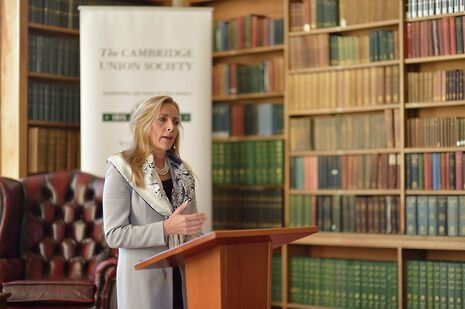Interview: Rona Fairhead, Chair of the BBC Trust
Rona Fairhead talks to Varsity about the recent White Paper and the future of the BBC

Rona Fairhead, who obtained a double first from St. Catherine’s College, held positions including Chief Executive of the Financial Times Group and Director of HSBC Holdings before she became the first female Chair of the BBC Trust in 2014. She has received much media attention recently as the BBC renews its Royal Charter.
A ‘root and branch’ review is the term Fairhead frequently uses to describe the production of Culture Secretary John Whittingdale’s White Paper, published as part of the BBC’s decennial Charter Renewal. Yet what precisely she means by this term remains unclear, like many aspects of the BBC’s future. It has recently been announced that the BBC Trust is to be replaced by a 'unitary board', of which approximately half the members will be appointed by the government. The government will also give “guidance” about “content requirements” to Ofcom, the BBC’s external regulator, and that the licence fee is “likely to become less sustainable” in the long-term.
In 2015, celebrities such as J. K. Rowling, Stephen Fry and Dame Judi Dench signed a letter urging David Cameron not to “diminish” the BBC. It was revealed that the letter was at the request of Danny Cohen, who, according to Michael Palin, “just asked ‘Would you sign? The charter is coming up we’re a bit worried the BBC would become smaller and less significant.’”
Before meeting Fairhead, I read a tweet by the satirist Armando Iannucci, which refers to the production of the White Paper as “10 or so months of uncertainty and anti-BBC tone that damaged the best TV industry in the world”. It is in light of this that I ask her why she thinks there’s been so much interest in and difficult with the Charter Renewal this time around.
A poised and commanding presence, clearly well-versed in responding to journalists’ questions, Fairhead initially denies the difficulty implicit in Iannucci’s tweet to which I refer. She then responds: “The amount of time to talk through a charter is similar [to] the last time ten years ago – it was again two or three years of analysis and study. It’s just normal”, before conceding that there has indeed been concern, at the time of this White Paper, regarding the BBC’s content and how it will be produced in the future:
“I think the degree of concern probably has raised but that was because there was a suggestion that there was going to be a ‘root and branch’ review’ and there was an awful lot of media comment about some ideas. Some ideas definitely were in the offing that actually would have damaged what the public want; either the idea of universality, or the way it’s funded, which the public had another problem with.”
As Director-General Tony Hall writes in an official statement about the White Paper, “There has been some big debate about the future of the BBC. Searching questions have been asked about its role and its place in the UK.” Fairhead suggests that at the heart of this concern is fear of a gradual ‘sapping’ of the BBC as an institution “or a possibility that [its] independence and its ability to hold to account would be sapped.”
I ask Fairhead if she thinks that concerns may be due to the changing way we consume media; she uses the word ‘protection’ and I ask if the BBC is under threat. She is confident that this is not the case: “I think there is an ability of the BBC to respond to technological changes, to media [and] consumption changes.”
“As for the next 11 years,” she says, “the challenge now is on content.”
“It’s not perfect,” she admits, “the BBC’s not perfect”, but she maintains that they must take continue to take creative risks in the future. Yet what may be classed as a ‘creative risk’ is somewhat ambiguous. While Fairhead cites ‘The Great British Bake Off’ as one example – “the risk that they took on putting a bunch of people inside a tent in the middle of a field to bake cakes and having a competition about it” – she also mentions programmes such as ‘Murdered By My Boyfriend”, claiming that this is the sort of programme other broadcasters may shy away from.
Whatever uncertainties may remain about the future of the BBC, one thing remains certain: that Rona Fairhead will remain an effusive figurehead and advocate of the organisation, about which she waxes lyrical. Hall’s statement continues, “[referring to the ‘questions’] That’s right and healthy, and I welcome that debate” and Fairhead echoes the optimism of this sentiment as she tells me:
“I think the White Paper is a recognition. I think it’s, you know, to do a really thorough review and come out and say ‘actually that’s a good thing to do’ is actually the right thing. You know, to do. And that’s the point of it. It shows democracy working.”
 Interviews / You don’t need to peak at Cambridge, says Robin Harding31 December 2025
Interviews / You don’t need to peak at Cambridge, says Robin Harding31 December 2025 Comment / What happened to men at Cambridge?31 December 2025
Comment / What happened to men at Cambridge?31 December 2025 News / Unions protest handling of redundancies at Epidemiology Unit30 December 2025
News / Unions protest handling of redundancies at Epidemiology Unit30 December 2025 News / Varsity’s biggest stories of 202531 December 2025
News / Varsity’s biggest stories of 202531 December 2025 News / Downing investigates ‘mysterious’ underground burial vault 29 December 2025
News / Downing investigates ‘mysterious’ underground burial vault 29 December 2025









